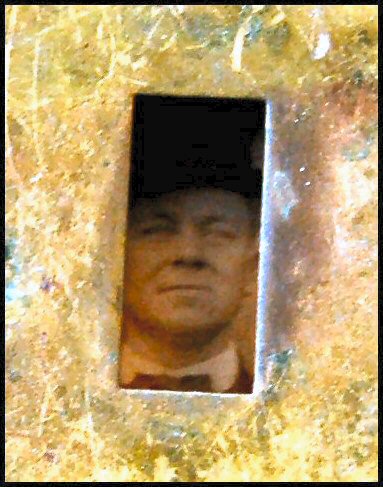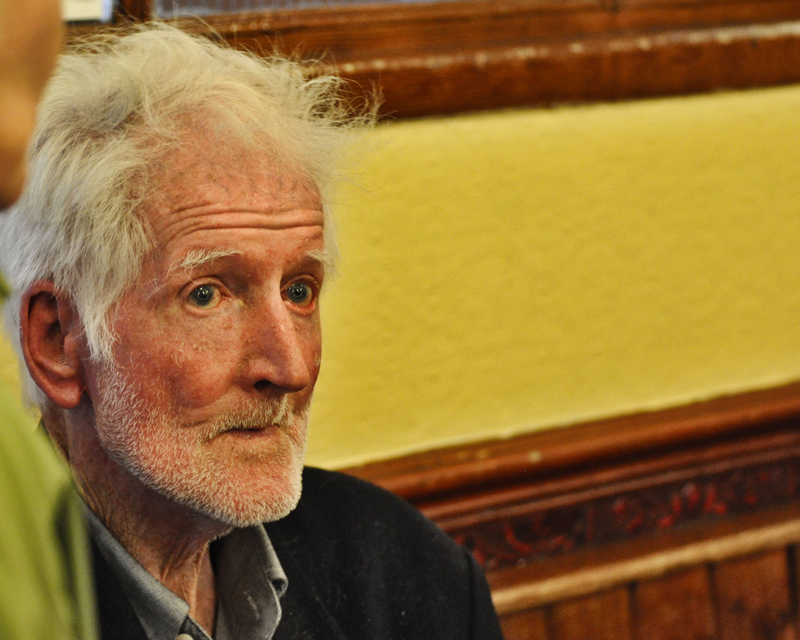
Let’s call that man Jake.
Jake may have had any number of reasons for hiding that chicken.
Perhaps his father was overweight. Perhaps his father was selfish and had never shared with the son. Perhaps the father was vegan.
Perhaps the father had been gone for thirty years, and much was unresolved.
*
Perhaps the old man came, had a drink, and went away.
*
But let’s assume, before leaving, that the father sat down at the table, in the room suffused with the scent of roasted bird, sipped his cold drink, and acted as if it were any other day, any other visit.
Did it go something like this –
“So Jake, how have things been?”
“You know Dad, some bad, some awful.”
“How’s work.”
“I’ve changed jobs.”
“Is your mother doing okay?”
“The usual complaints. She’s 93 you know. She can’t drive.”
*
After the man left, did Jake and his wife Nora pull the cooked chicken from the oak cupboard, set out two dinner plates, and eat, finally, talking about the father’s unexpected visit?
Did it go like this –
“I was surprised to see him.”
“He looked well.”
“He never changes.”
“I wish he had been there for me, when I was a boy.”
*

None of that is right.
It probably went like this –
The father knocks. Jake answers. He invites his father in. He makes his father a stiff drink. They sit awkwardly, in facing chairs, both of them aware that the room reeks of baked chicken and tarragon.
“What are you doing here, Dad?”
“I came to see how things are.”
“It’s been thirty years.”
“I’ve been busy.”
“Thirty fucking years.”
“Are you and Nora still married?”
“Christ Dad, thirty fucking years.”
And then, perhaps, Nora appears at the bottom of the steps, balancing a basket of dirty clothes on her hip.
“My father’s here.”
“I see. Hello, Mr. Frosch. What a surprise.”
“You’re looking well, Nora.”
“Dad. Thirty years.”
*
Why would Jake’s dad disappear for thirty years? This is something any son would want to know, need to know, resent not knowing.
*
Perhaps Jake demands of his father, “Give me an explanation or leave right now.”
The father is old, slow to react, white-whiskered and wrinkled. He balances the drink in his hand, closes his eyes. Seems almost to fall asleep.
Eventually, he says, “I died.”
“No you didn’t.”
“I did, son. Dead dead. As in died.”
“You didn’t die. How could you have died without me knowing about it?”
“Well it’s not as if I could tell you I was dead. Could I, Jake? How would I do that?”
Jake shivers, involuntarily.
Nora has retreated to the basement, where she loads the washer slowly, partly because she had never known how to act around Jake’s father, partly in the hope that the two men could work out their differences if left alone.
The old man pulls a folded, yellowed bit of newsprint from his shirt pocket, hands it to Jake.
“My obituary.”
“This isn’t real.”
“Lot of things aren’t real Jake. I’m dead. Yet I’m here.”
“Jesus, Dad.”
“I’ve seen him. Yes.”
*
None of this makes any sense. Which has no bearing on the truth.
*
There is a chicken hidden in an oak cupboard. A father has mysteriously returned after thirty years. The father claims to be dead. Somewhere, a family is sitting down to a nice chicken dinner.
*

“Maybe I was trying to spare you.”
“Spare me?”
“What kind of a father was I? Think, Jake. Then answer.”
Jake can’t even name the emotion he is feeling, or rather the wash of emotions. Anger is in there, of course, utter confusion, love, fear, spite, a disorienting sense that his life is now unpredictably spinning.
“You were a lousy father. You were never home. You loved a good card game better than you loved your children. You were barely a father at all.”
Jake’s father sips his drink. Sets it down. Pulls a while at his arthritic knuckles as if trying to pop them back into alignment.
“So, what kind of a father would I have been for those thirty years you can’t stop mentioning?”
”What the hell kind of question is that?”
“An easy one.”
*
Jake’s father doesn’t leave after the drink is finished.
How could he?
*
Jake stares out the front window. None of it makes any sense.
Which, again, has no bearing on the truth.
*
Nora comes up from the basement, empty-handed.
She looks around the room, and then at Jake.
“Where’s the chicken?” she asks.





